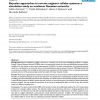Free Online Productivity Tools
i2Speak
i2Symbol
i2OCR
iTex2Img
iWeb2Print
iWeb2Shot
i2Type
iPdf2Split
iPdf2Merge
i2Bopomofo
i2Arabic
i2Style
i2Image
i2PDF
iLatex2Rtf
Sci2ools
129
Voted
BMCBI
2007
2007
Bayesian approaches to reverse engineer cellular systems: a simulation study on nonlinear Gaussian networks
Background: Reverse engineering cellular networks is currently one of the most challenging problems in systems biology. Dynamic Bayesian networks (DBNs) seem to be particularly suitable for inferring relationships between cellular variables from the analysis of time series measurements of mRNA or protein concentrations. As evaluating inference results on a real dataset is controversial, the use of simulated data has been proposed. However, DBN approaches that use continuous variables, thus avoiding the information loss associated with discretization, have not yet been extensively assessed, and most of the proposed approaches have dealt with linear Gaussian models. Results: We propose a generalization of dynamic Gaussian networks to accommodate nonlinear dependencies between variables. As a benchmark dataset to test the new approach, we used data from a mathematical model of cell cycle control in budding yeast that realistically reproduces the complexity of a cellular system. We evalua...
| Added | 12 Dec 2010 |
| Updated | 12 Dec 2010 |
| Type | Journal |
| Year | 2007 |
| Where | BMCBI |
| Authors | Fulvia Ferrazzi, Paola Sebastiani, Marco Ramoni, Riccardo Bellazzi |
Comments (0)

